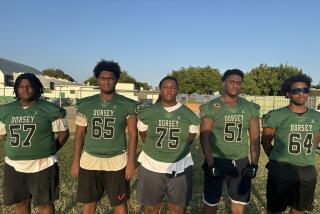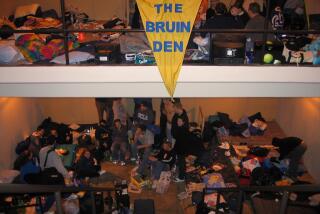A Dorsey athlete musters faith and hope for his mother
Each weekday, when classes are done and the last bell sounds at Dorsey High, Jeremiah Allison steels himself. He folds his lean frame into a weathered SUV and drives three miles to a convalescent home in South Los Angeles.
Slowly, somberly, sneakers sliding softly against the linoleum floor, he enters room 214.
“Hi, Mom,” he says, voice hushed. “Mom?”
Time slows. Jeremiah, 17, holds her hands and kisses her cheeks. He tells her about his day, speaks of the prom and the future, of his college scholarship and how good it will be to live far from the troubled neighborhood where she raised him.
Tugging his black baseball cap to shield his watery eyes, he flips through Bible verses on his cellphone and reads to her.
“I will give you a new heart and put a new spirit in you....”
“Show me your ways, Lord, show me, show me....”
Lucille Allison does not answer. True, the other day, when he walked into the room, she lifted her chin. But mostly she is stilled, her eyes frozen on the middle distance, a woman trapped in a world nobody can penetrate, not even the boy in whom she had placed so much hope.
::
The first time I met Lucille “L.A.” Allison, she was humming a gospel tune. It was 2009, and she stood on the sidelines of a high school football game in San Diego, watching her son.
She was impossible to ignore. Wide-hipped, round-eyed and toffee-skinned, she had enough sass to light the dark Southern California sky. I watched a play unfold on the field and she raised her arms, pointing like a wizard at the scrum, asking the heavens for luck.
“Mr. Kurt,” she said, “you know about my boy?”
No, I said. I was looking for a story and didn’t know the players yet.
“My son is special,” she said, eyes twinkling, a firmness in her voice that gave me pause. “Been that way since he was born. Jeremiah is going to make it. Not just in football. He’s going to be a lawyer one day.”
He was a sophomore then, a defensive lineman, skinny and weak compared to many of the others. But when he spoke, his teammates listened, even the seniors. Dorsey played from behind most of the evening, causing some of his teammates to mope and whine. Not Jeremiah. He never gave up, never complained, never held his head down. Special? She was right.
Over the next few weeks, as I kept watching the team, I spent a lot of time talking to Lucille and Jeremiah.
I learned how, when he was a toddler, she was mired in poverty and in an awful relationship. Back then, to feed Jeremiah and his older sister and to pay for the cold motel rooms where they sometimes slept, she begged.
Eventually she settled her family in a little house on 64th Street in a neighborhood where gunshots were the backbeat of life. Scraping by on odd jobs and disability checks for a balky heart, she grew obsessed with ensuring that her three children follow a straight path. She told Jeremiah, smart and athletic, to lean on God, school and football, in that order.
To steer him clear of gangs, she wouldn’t allow him to hang out in front of the house, or to set foot inside a city bus, or to go anywhere without her permission. Every time he left home, she prayed.
He could have rebelled.
Instead, he vowed to become successful enough to give his mom and his family a better life.
“The way she pushed me,” he says, “it was never something I didn’t like.”
After I wrote about Jeremiah and his mother and Dorsey High School’s football rivalry with Crenshaw High, Lucille and I stayed in touch. When I told her that my wife and I were trying to have a baby but hadn’t had any luck, she chanted one of her special prayers. A year later, when my son was born, we spoke again. Those prayers worked, she said, chuckling, aware of my skeptical streak. “See,” she said. “You just have to believe.”
By last fall, everything Lucille had prayed for was coming true. Jeremiah was a senior and in the running to be Dorsey’s valedictorian. He was no longer skinny, no longer weak. At a school with a vaunted football tradition, he had become one of the best players ever. College coaches called from UCLA and Stanford and nearly every other major West Coast school. They even called from Yale.
::
Then last December as he sat in class, Jeremiah got a text message from his sister. “Mom is not moving!”
Paramedics found her on her bedroom floor. They took her to a downtown hospital. It was a heart attack. Rumors spread that she was dead. Scores of Dorsey coaches, teachers, students and parents arrived. Nobody knew what to think, but they knew where to turn.
“Jeremiah was the center of the world for 200 people,” recalls Martin Ludlow, a former Dorsey coach. “And he was being stronger than most adults could have been. There were tears and hugs, everybody just holding on, and in the middle of it, Jeremiah, helping keep us together, the way his mother taught him to be.”
Lucille pulled through, but only so far. The trauma had deprived her brain of oxygen. She was in a coma. All anyone could do was wait and watch and pray.
Early this year, Jeremiah had to make the decision that he and his mother had talked about for years. Where would he attend college? The East Coast was too far now. When he felt UCLA’s interest wane, he chose Washington State, whose new coach flew to meet Jeremiah soon after Lucille collapsed.
The prairies of eastern Washington are 900 miles from the convalescent home, but Jeremiah says his mother would be happy. She wanted him to become his own man, firm in his decisions. Once he’s in college, he says, he’ll talk to her every day on a speakerphone in her room. Every chance, he’ll fly home.
For now, he and his sister Mary, 19, live in the old house and have the help of their extended family. The prom looms, then graduation, then summer and the trip to Pullman for freshman year.
Jeremiah says doctors have told him his mother’s brain damage is irreversible. He doesn’t believe them. So he keeps coming to her side, every day, no matter what.
On the recent afternoon when her chin moved in a small, slow arc, his eyes widened with hope. “One day,” he said, “I’m going to be with my mom, and we’re going to walk out of this place, laughing.”
Maybe so. Maybe, as Lucille told me: “You just have to believe.”
More to Read
Sign up for Essential California
The most important California stories and recommendations in your inbox every morning.
You may occasionally receive promotional content from the Los Angeles Times.











